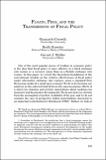Artículo
Floats pegs and the transmission of fiscal policy
Fecha
2013Resumen
One of the most popular pieces of wisdom in economic policy is the idea that fiscal policy is more effective in a fixed exchange rate regime or a currency union than in a flexible exchange rate regime. In this paper we revisit the theoretical foundations of the conventional wisdom on the relative effectiveness of fiscal policy under alternative exchange rate regimes using a standard New Keynesian model of a small open economy. We do so by focusing our analysis on the inherent link between the macroeconomic effects of a short-run stimulus and private expectations about medium-run monetary and fiscal policy developments. We do not however deviate from the assumption of perfect credibility of the peg and we do not consider the case of prospective deficit monetization discussed in an important contribution by Dornbusch (1980).
Colecciones
Descargar


